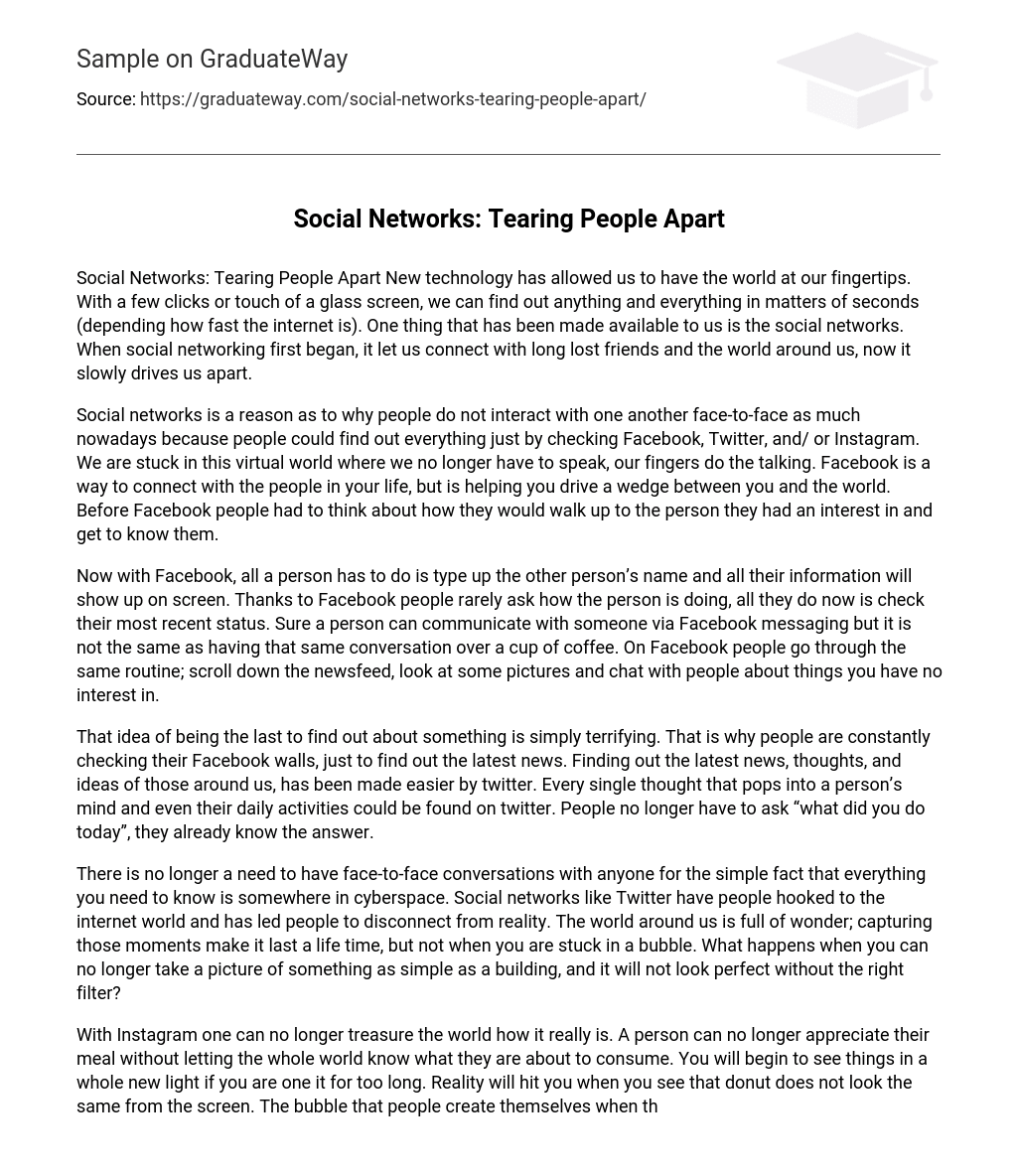With the advent of new technology, accessing information from around the world has become exceptionally convenient through a few clicks or taps on a glass screen. In a matter of seconds (subject to internet speed), we can acquire knowledge about any subject. Among the numerous advantages offered by technology, social networks have emerged as an influential presence. Initially, these platforms enabled us to reconnect with old friends while connecting with individuals worldwide. Nonetheless, over time they began fostering division among people.
The advent of social media has caused a decline in in-person interactions among people. Presently, individuals can effortlessly acquire knowledge on various topics by browsing through Facebook, Twitter, and/or Instagram. We are heavily immersed in this virtual realm where verbal communication is no longer essential since our fingers serve as the means of expression. Although Facebook enables us to connect with others who are part of our lives, it may also result in detachment from real-life experiences. Previously, before the introduction of Facebook, individuals had to strategically strategize their methods when attempting to establish connections with desired acquaintances.
Facebook has transformed the way individuals seek information about others, as now a person’s name search unveils their complete details. This change in behavior allows people to simply check someone’s latest status instead of directly asking them how they are doing. Although Facebook provides messaging features, it fails to replicate the genuine connection found in face-to-face conversations over coffee. On this platform, individuals frequently fall into a monotonous pattern of scrolling through the newsfeed, viewing pictures, and participating in discussions that lack true engagement.
The constant fear of being uninformed is a scary experience, causing individuals to constantly monitor their Facebook walls for the most recent updates. Twitter has simplified the process of finding current news, thoughts, and ideas that are shared by our friends. Through Twitter, we can effortlessly uncover what individuals are thinking and doing on a daily basis without needing to inquire directly.
With the accessibility of online information, face-to-face conversations have become obsolete. Social media platforms such as Twitter have mesmerized people, disconnecting them from the real world. Despite the abundance of remarkable things to capture and immortalize, being limited to a virtual bubble poses difficulties. What occurs when even taking a picture of a simple building necessitates using the ideal filter?
Instagram has revolutionized our perception of the world, with people now feeling compelled to share every aspect of their lives, even meals. However, excessive time spent on the platform can distort our reality as we may discover that the food depicted in pictures doesn’t appear the same in real life. Ultimately, this continual scrolling through images disconnects individuals from the actual world.
Many people are so reliant on social media that they cannot have a conversation without mentioning it, trapping themselves in a virtual world unknowingly. Everyone with a social network and phone access feels the constant urge to post or check for updates. Although social networking once brought people closer, now it impedes their communication with those outside this realm, gradually fragmenting relationships.
In his essay titled “What Adolescents Miss When We Let Them Grow up in Cyberspace”, Bret Staples contends that teenagers who spend excessive time on computers are likely to miss out on real-life experiences. According to Staples, today’s teenagers are highly connected to the world but disconnected from the social encounters that have traditionally fostered their transition into adulthood. This addiction to social networks has the potential to significantly impact individuals’ lives, especially among teenagers.
Due to their reliance on social networks, people are lacking important communication skills like speaking and interacting in interviews. Originally designed to facilitate connections and promote understanding, platforms such as Facebook, Twitter, and Instagram have inadvertently impacted people’s daily lives. Nowadays, it is simpler for individuals to communicate through these social networks rather than engage in face-to-face interactions. Instead of making a phone call to inquire about someone’s well-being, one can easily click a few buttons to get updates on the person’s life.





